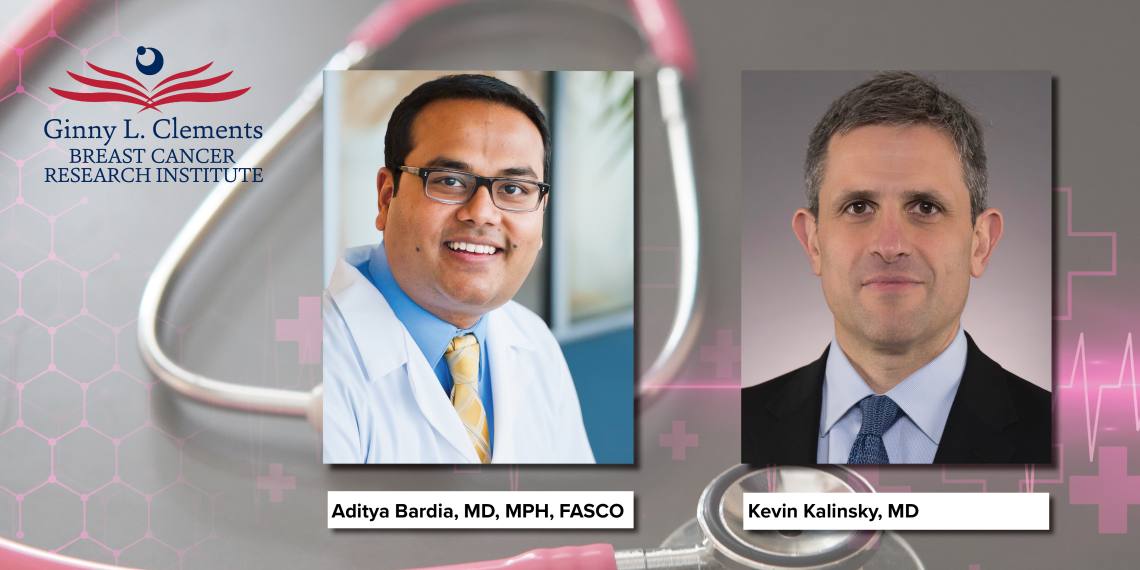Ginny L. Clements Breast Cancer Research Institute Annual Symposium, April 24

Event tackles precision medicine, healthcare disparities
Breast cancer precision medicine––tailoring a treatment specifically to each patient––is the hope for patients and goal of cancer clinicians and scientists. Through the newest trials, research and discoveries, the ambitious aim of targeted care is now materializing.
Precision medicine and addressing health disparities are two important themes for this year’s Ginny L. Clements Breast Cancer Research Institute Annual Symposium, 8:30 a.m. to 5:30 p.m., on April 24, at the University of Arizona Health Sciences Innovation Building.
Tackling precision medicine
Speaker on tailoring breast cancer treatment is Kevin Kalinsky, MD, director of the Glenn Family Breast Center and Breast Medical Oncology at the Winship Cancer Institute of Emory University, director of the Division of Medical Oncology, Department of Hematology and Medical Oncology, and professor in the Department of Hematology and Medical Oncology.
Dr. Kalinsky said that the focus of his breast cancer center has been to move away from a one size fits all approach into further individualized treatments. He said they are also able to correlate treatment with the patient’s specific type of breast cancer, such as estrogen-driven breast cancer or HER2 positive breast cancer, for better outcomes.
Kalinsky said during the past 20 years, he has seen major advancements in breast cancer innovations.
“Now, there are tens of thousands of women who we can safely say to them, ‘You can forego chemotherapy, and you just need endocrine therapy,’” Dr. Kalinsky said.
According to Dr. Kalinsky, some of the changes in breast cancer research, especially with early stage and metastatic breast cancer, include better targeted drugs that allow doctors to be more selective in performing surgery.
“Patients live longer with metastatic breast cancer across various sub types of breast cancer. This has been a major advance,” he said. “We're awaiting study to see their role in early-stage breast cancer, and it has the potential to change our field.”
Aditya Bardia, MD, MPH, FASCO, professor of medicine, Geffen School of Medicine at UCLA, director, Breast Oncology Program, assistant chief (Translational Research), Medical Oncology Division and director of Translational Research Integration from UCLA Health Jonsson Comprehensive Cancer Center, will discuss the development of targeted therapies, particularly antibody drug conjugates, to help patients with metastatic breast cancer.
Dr. Bardia said that clinical trials are critical to cancer discovery development because therapies that are now standard of care once went through clinical trials.
“Clinical trials allow patients to access potentially promising therapies before they become widely available, and they help move the field forward,” he said.
The event schedule includes a keynote presentation from Nancy G. Brinker, who is the founder of the Susan G. Komen Breast Cancer Foundation and the Promise Fund of Florida. Brinker is also a U.S. ambassador and lifetime member of the Council on Foreign Relations. Brinker will discuss “Developing a Continuum of Care Model to Address healthcare Disparities in Breast and Cervical Cancer: The Promise Fund’s Approach.”
Ginny L. Clements, the eponymous founder of the breast cancer institute who is also a breast cancer survivor, will participate in a fireside chat with Nancy Brinker in the afternoon more information on Brinker and Clements to follow in the April 2024 Cancer Center newsletter.
For more information and to register, visit the Ginny L. Clements Breast Cancer Research Institute Symposium page.

